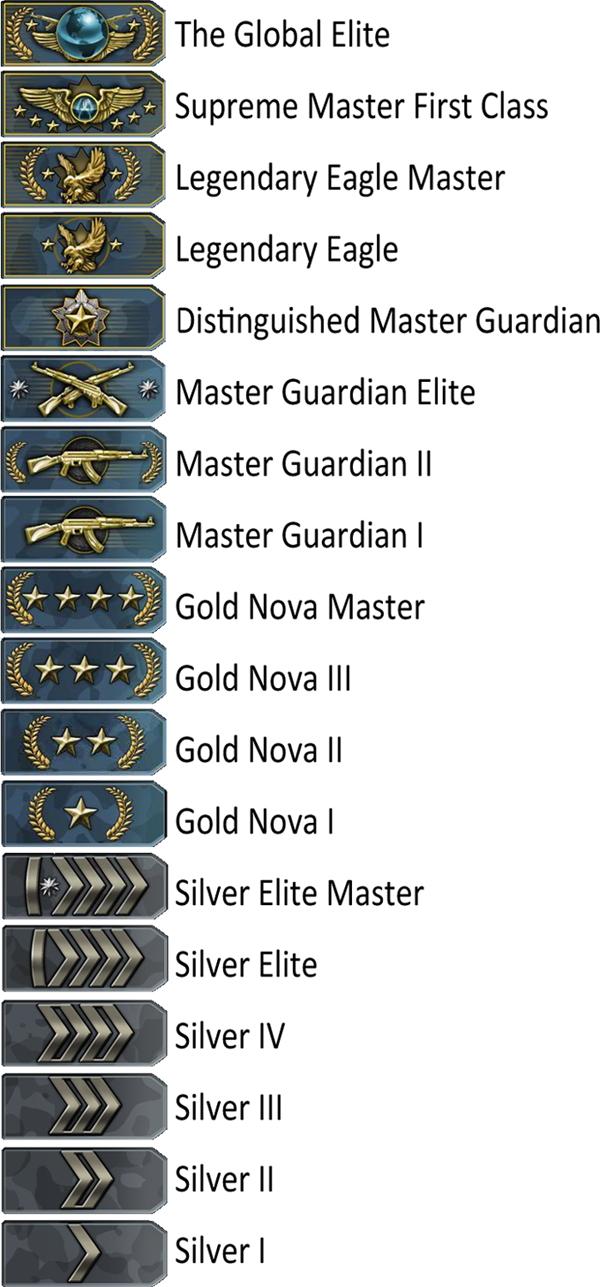Bright Insights Hub
Your go-to source for the latest news and information across various topics.
Unmasking CSGO Skill Groups: The Surprising Truth Behind Your Rank
Discover the shocking secrets of CSGO skill groups! Unveil the truth behind your rank and level up your game today!
Understanding CSGO Skill Groups: How Ranks Are Determined
In Counter-Strike: Global Offensive (CSGO), skill groups are essential for matchmaking, allowing players to compete against opponents of similar skill levels. The game categorizes players into various ranks, ranging from Silver to Global Elite, based on their performance in competitive matches. Ranking is determined through a combination of factors, including win-loss records, individual player statistics, and match performance metrics. It's important to note that CSGO utilizes a hidden matchmaking rating (MMR) system to assess player skill. This rating adjusts dynamically as players win or lose matches, making it crucial to consistently perform well to ascend in ranks.
The process of determining ranks is not solely dependent on victories; it also factors in individual contribution to the match. For instance, players who achieve high kill counts, assist teammates effectively, or demonstrate strategic gameplay are likely to see a positive impact on their rank progression. Moreover, players may experience rank resets, especially after significant updates or changes in matchmaking algorithms. Understanding these elements is vital for players aiming to improve their rank within the game, as focused practice and teamwork can lead to better performance and ultimately, higher CSGO skill groups.

Counter-Strike is a popular team-based first-person shooter that has captivated gamers worldwide. Players can choose from various weapons, including the distinctive kukri knife cs2, adding to the strategic depth and excitement of the game. With its emphasis on teamwork and tactical gameplay, Counter-Strike continues to be a staple in the esports scene.
The Hidden Factors Affecting Your CSGO Rank
Ranking up in CSGO can often feel like a daunting task, as many players grapple with various hidden factors that can significantly influence their overall performance. One of the most crucial aspects to consider is your team synergy. Working in harmony with your teammates and understanding their playstyle can drastically improve your chances of winning matches. Additionally, communication is vital; effective callouts and strategic discussions during gameplay can turn the tide in tight situations. Don't underestimate the power of a well-coordinated team!
Another hidden factor that plays a pivotal role in determining your CSGO rank is your individual mental state. Stress and frustration can impair your decision-making abilities, leading to mistakes that may cost you games. Regularly taking breaks, maintaining a positive mindset, and focusing on self-improvement can help you maintain a steady performance. Finally, consider optimizing your settings; adjusting your mouse sensitivity, graphic settings, and keybindings can create a more comfortable playing environment, ultimately benefiting your gameplay.
Is Your CSGO Rank a True Reflection of Your Skill Level?
When assessing a player's ability in CSGO, many often wonder, Is your CSGO rank a true reflection of your skill level? While ranks are designed to represent a player's competitive performance, they can be influenced by numerous factors. For example, match-making algorithms may not always pit players against equally skilled opponents, leading to variances in rank that do not accurately depict an individual's true skill. Additionally, factors such as team dynamics, communication, and even the player's mental state on the day of a match can significantly impact performance, resulting in inconsistency that challenges the validity of rank as a sole measure of skill.
Moreover, CSGO ranks can be affected by trends in the game, including changes to map rotations, weapon balance, and the overall meta. Players who adapt quickly to these changes might find their ranks reflecting temporary spikes or drops that do not genuinely represent their long-term abilities. It’s essential to consider both personal improvements and external influences when evaluating your performance. As a player, it is beneficial to focus on developing skills through practice, studying game mechanics, and analyzing gameplay instead of placing too much emphasis on rank alone. Ultimately, while rank can provide a guideline, true skill is often revealed in consistency and adaptability rather than numbers alone.